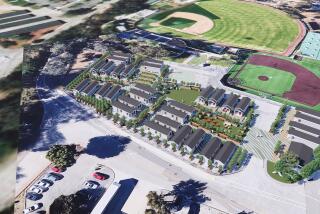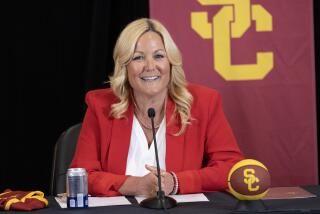USC unveiling plans for $650-million housing, retail complex
- Share via
USC on Monday is to unveil the final and somewhat altered design of the biggest construction project in the university’s history: a $650-million housing and retail complex just north of the main campus.
Replacing a now-demolished shopping center along Jefferson Boulevard and Hoover Street, the new USC Village is to include living space for 2,700 undergraduate and graduate students in five-story residence halls, a large grocery store, a drugstore, a fitness center, restaurants and other shops. The design, all in the so-called Collegiate Gothic style that echoes much of USC’s campus, surrounds a plaza that officials said they hoped would become a public gathering place.
The formal groundbreaking is Monday, with the target completion date in fall 2017.
“This is by far the biggest thing USC has ever done and probably ever will do. We are growing to the north in a big way,” USC President C. L. Max Nikias said in a statement. Nikias is to lead the groundbreaking ceremony, which will be attended by other campus leaders and representatives of city and county government.
The project, however, has at least temporarily dropped a hotel and movie theater that were prominent in previous designs. That change was made in part because more hotels and cinemas have been built in downtown Los Angeles in recent years, officials said, adding that they might still consider adding those features in future developments.
The eateries and stores are aimed at the wider neighborhood, not just students, said Thomas Sayles, USC’s senior vice president for university relations. “Bear in mind that students are here only nine months a year. So for this to be as economically viable as we think it will be, we need to serve the community,” he said. “And the community needs these options for better dining and better retail.”
The plan faced earlier opposition from some neighborhood activists about its large scale and possible effect on hastening gentrification in the area south of downtown Los Angeles. As a result, during the city’s review of the 15-acre proposal, USC agreed to pay $20 million to support affordable housing in the area, among other pledges to help the neighborhood. Sayles said that USC already has paid $10 million of that to a city housing program.
Security measures have been beefed up at USC in the wake of the slayings of three Chinese graduate students near the campus over the last two years. Anti-crime efforts will be apparent at the University Village as well. Between 9 p.m. and 6 a.m., only students, staff, faculty and registered guests will be allowed to enter the complex.
Sayles said that should not be a bother to non-USC neighbors because most shopping malls close at 9 p.m.; restaurant diners entering before 9 p.m. will be able to stay, and anyone with later reservations will be allowed in.
The University Village plaza will feature a symbol of female power, as a counterpoint to the Tommy Trojan statue on the main campus. A statue will depict Hecuba, the wife of King Priam of ancient Troy. Collegiate football did not figure much in tales of antiquity, but Nikias noted that Hecuba urged the Trojans to fight on “even when they were outnumbered, exhausted, facing impossible odds.”
The university is paying for the project with donations and cash on hand, although it might consider borrowing in the future, Sayles says. The design being unveiled Monday is by the architecture firm Harley Ellis Devereaux.
[email protected]
Twitter: @larrygordon
More to Read
Sign up for Essential California
The most important California stories and recommendations in your inbox every morning.
You may occasionally receive promotional content from the Los Angeles Times.











